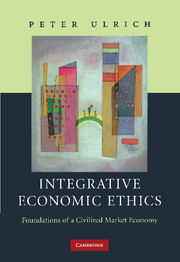Book contents
- Frontmatter
- Contents
- List of figures
- Preface
- Translator's note
- Introduction: orientation in economic-ethical thinking
- Part I Fundamental concepts of modern ethics and the approach of integrative economic ethics
- Part II Reflections on the foundations of economic ethics I: a critique of economism
- Part III Reflections on the foundations of economic ethics II: rational economic activity and the lifeworld
- Part IV A topology of economic ethics: the ‘sites’ of morality in economic life
- Bibliography
- Index of subjects
- Index of names
Preface
Published online by Cambridge University Press: 22 September 2009
- Frontmatter
- Contents
- List of figures
- Preface
- Translator's note
- Introduction: orientation in economic-ethical thinking
- Part I Fundamental concepts of modern ethics and the approach of integrative economic ethics
- Part II Reflections on the foundations of economic ethics I: a critique of economism
- Part III Reflections on the foundations of economic ethics II: rational economic activity and the lifeworld
- Part IV A topology of economic ethics: the ‘sites’ of morality in economic life
- Bibliography
- Index of subjects
- Index of names
Summary
At the beginning of the road leading to this book stood the creation of the first Chair of Economic and Business Ethics in the Economics or Business Faculty of a German-speaking university. This happened at the University of St Gallen in Switzerland in 1987. It was my privilege to take on this demanding task. My habilitation thesis Transformation der ökonomischen Vernunft (Transformation of Economic Reason) provided the foundation for the development of the St Gallen approach of integrative economic ethics, which differs fundamentally from existing international approaches. It is satisfied neither with the dominant concept of applied ethics in Anglo-Saxon countries, which employs ethics simply as a corrective against economic rationality, nor with ‘moral economics’ as a functionalist reduction of ethics to economics, such as is advocated by an influential school of economic thought in the German-speaking countries. The integrative approach endeavours rather to throw light upon the inherent normativity of economic rationality itself and to develop a comprehensive idea of ethically integrated economic rationality. The integrative approach also describes a third path beyond the usual alternatives in regard to the social framework in which a literally ‘civilized’ market economy must be embedded. Economic ethics is understood as what it implicitly or explicitly always inevitably is: a domain of political philosophy.
The book Integrative Wirtschaftsethik was published in the summer of 1997 after a developmental phase lasting ten years. In the intensive German-language debate on this young but highly topical discipline it met with a lively response.
- Type
- Chapter
- Information
- Integrative Economic EthicsFoundations of a Civilized Market Economy, pp. ix - xiPublisher: Cambridge University PressPrint publication year: 2008

